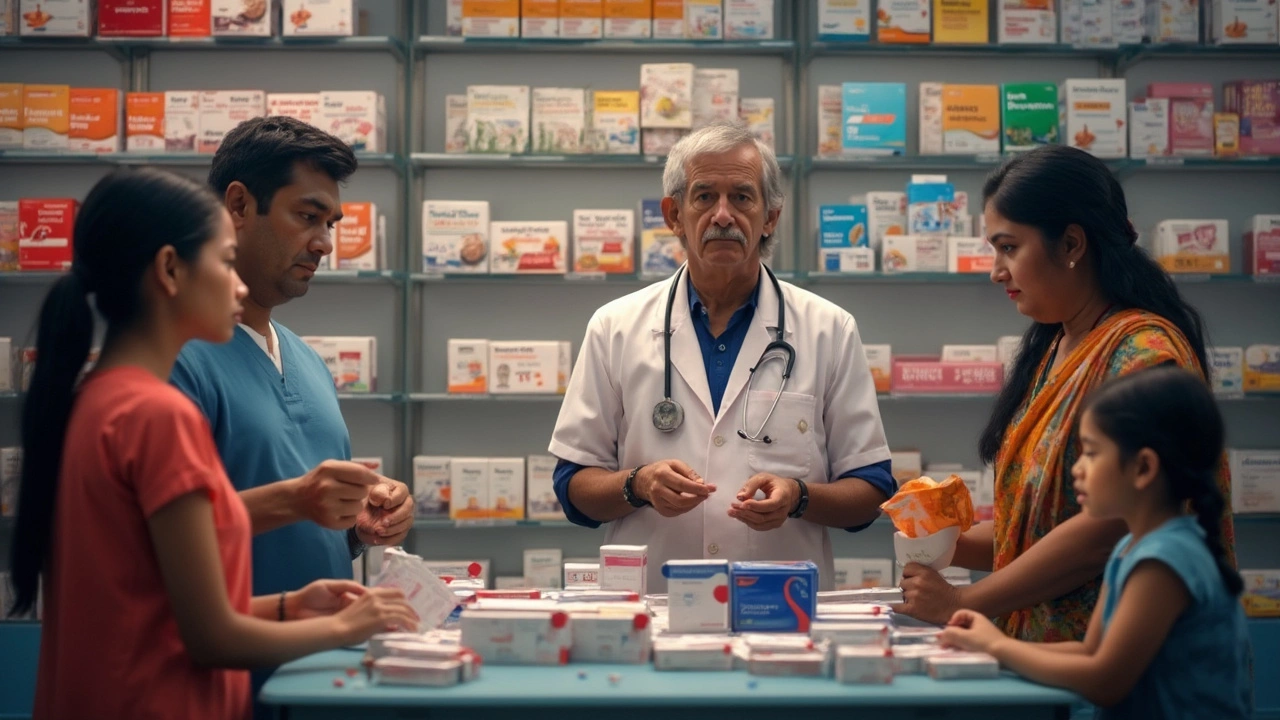
If you walk into any Indian pharmacy, chances are you’ll spot Cipla’s name right away. But what does that label actually cover? Cipla isn’t just another company cranking out pills—it’s one of the reasons HIV drugs got affordable in India. Hospitals depend on them for common antibiotics, cancer meds, heart pills, and heaps of asthma inhalers. So if you’ve ever popped a tablet made in India, there’s a solid chance it came from Cipla.
You might be thinking, do they only sell generics or real breakthrough stuff too? Turns out, Cipla covers both fronts. Their product lineup stretches from lifesaving antiretrovirals for HIV, to everyday cold medicines, to inhalers for asthma and COPD that even get shipped overseas. They handle hundreds of active ingredients—if it’s a big disease, they’ve probably got a drug for it. This isn’t just about making cheap copies; it’s about making crucial meds more available for everyone.
- Cipla at a Glance: What Sets Them Apart?
- Big Categories: From Antivirals to Asthma
- Flagship Drugs You’ll See Everywhere
- Why Cipla’s Generics Win Trust
- Tips for Patients: Getting the Right Cipla Medication
Cipla at a Glance: What Sets Them Apart?
Cipla isn’t just a familiar name on medicine boxes in India—it’s a global heavyweight. Founded way back in 1935 in Mumbai, Cipla has always focused on one big thing: making crucial medicines affordable and accessible, especially in countries where people need them most. What really makes Cipla stand out is their mix of relentless innovation and a no-nonsense, practical approach to drug pricing.
This company grabbed headlines in 2001 when it started selling triple HIV therapy in Africa for under $1 a day. That move changed access to treatment worldwide. Today, Cipla has over 1,500 products and a presence in more than 80 countries. They crank out everything from basic paracetamol tablets to complex cancer drugs, and a major chunk of their sales comes from exports. So, you’re talking about a business that puts Indian pharma on the global stage every single day.
Cipla’s edge comes from a few things:
- Cipla focuses heavily on generics, meaning they copy big-brand drugs after patents expire, so more people can actually afford them.
- They’re relentless with R&D—hundreds of scientists are always working on new versions, better delivery methods (like inhalers), and even niche rare-disease drugs.
- They invest big in quality control, regularly passing tough checks from the US FDA, WHO, and the UK’s MHRA. It’s why doctors across continents trust their medicines.
- They specialize in high-need areas: HIV/AIDS, respiratory diseases like asthma, cancer, heart disease, and antibiotics.
Got a soft spot for numbers? Here’s how Cipla stacks up these days:
| Fact | Data (2025) |
|---|---|
| Founded | 1935 |
| Countries served | 80+ |
| No. of products | 1,500+ |
| Employees | 25,000+ |
| Annual revenue (INR) | ₹25,000+ crore |
| Major areas | Respiratory, HIV/AIDS, Cardiology, Oncology, Anti-infectives |
Thanks to partnerships with governments, NGOs, and even Big Pharma, Cipla keeps grinding out what people actually need, not just what pays big. And that single-minded focus on value and quality is why they’re much more than “just another Indian pharma brand.”
Big Categories: From Antivirals to Asthma
Cipla doesn’t mess around when it comes to variety. They roll out meds for pretty much every major health problem out there. It’s not just about numbers—it’s about covering the stuff people need most.
Let’s break down what you’ll actually see from them:
- Cipla made global headlines back in the early 2000s by slashing prices on HIV antiretrovirals, getting them to people in poorer countries for less than $1 a day. They’ve stuck to that mission, pushing affordable options for HIV, hepatitis, and other viral problems.
- If you’re asthmatic, there’s a very good chance you’ve used Cipla’s inhalers like Seroflo or Foracort. They supply hospitals across India and send a huge number of these products to countries in Africa and South America too.
- Common antibiotics? Yup, that’s Cipla too—think amoxicillin, azithromycin, and more. They even do combo packs for infections that are tough to crack.
- The cancer category is growing fast. Cipla makes affordable generics for drugs like imatinib (for leukemia) and temozolomide (for brain cancer), helping a lot of families save big on treatment costs.
- They’re locked in on chronic diseases as well: diabetes, blood pressure, cholesterol—you’ll find their brands in almost every pharmacy drawer.
Here’s a peek at some of Cipla’s top drug categories and typical uses:
| Drug Category | Common Cipla Products | Main Uses |
|---|---|---|
| Antivirals | Triomune, Viraday, Tenvir-EM | HIV/AIDS, Hepatitis |
| Respiratory | Foracort, Seroflo, Asthalin | Asthma, COPD |
| Antibiotics | AZEE, Cipro, Amoxycillin | Infections (bacterial) |
| Oncology (Cancer) | Imatib, Temonat, Erlocip | Cancers (leukemia, lung, brain) |
| Cardiovascular | Atorva, Cardace, Cilacar | Blood pressure, heart disease |
| Diabetes | Glucored, Amaryl, Glyciphage | Blood sugar control |
One smart tip: If you’re getting a prescription filled in India and the price is a shock, ask your pharmacist if the Cipla generic is available. Their quality-to-price ratio is usually tough to beat, and they’ve been around long enough that most doctors trust their stuff.

Flagship Drugs You’ll See Everywhere
When people talk about Cipla, it’s usually for their high-profile drugs that pretty much everyone has seen in chemist shops or hospitals. Let’s get real about what these are, and why doctors prescribe them all the time.
First, Cipla made global headlines by developing affordable antiretroviral meds for HIV, changing the entire fight against AIDS in low and middle-income countries. Their combo tablets like Triomune (which mixes three different HIV drugs) turned what used to be a death sentence into something manageable, especially in Africa and India. These are still staple drugs in many big HIV programs.
Chronic breathing trouble? Cipla’s respiratory lineup is huge. If you know someone using an asthma inhaler in India (or even Europe or Africa), odds are it’s from Cipla. “Seroflo” and “Foracort” inhalers are everywhere. Hospitals and clinics rely on them so much that the World Health Organization even includes Cipla inhalers in global health programs.
Antibiotics are another big deal. Cipla manufactures widely used generics like Ciplox (ciprofloxacin), Cefixime, and Azithral (azithromycin). These show up on prescription pads for everything from chest infections to traveler’s diarrhea. The prices are usually way less than brand-name versions, but the quality holds up great.
For folks fighting cancer, Cipla’s oncology drugs make conditions like breast, lung, and prostate cancer less devastating. Products like Erlocip (erlotinib) and Temoside (temozolomide) get used in leading Indian hospitals. They also cover pain relief and post-chemo recovery drugs that can really help restore some normal life when someone’s in the battle of their life.
Here are other Cipla heavy-hitters you’ll probably bump into, either in a pharmacy or hospital drawer:
- Duolin (asthma/COPD inhaler, widely used by all ages)
- ZYH CG (zinc supplements for diarrhea)
- Actemra (tocilizumab, for rheumatoid arthritis and COVID-19 management)
- Viraday (another key HIV/AIDS medicine)
If your routine involves treating anything from fever to serious long-term disease, Cipla’s product catalog is tough to avoid. Their reach shows up in dozens of countries, not just India. So next time you see their name, just know you’re looking at one of the most solid and far-reaching pharma lineups out there.
Why Cipla’s Generics Win Trust
When you hear “generic medicine” in India, Cipla is usually the first name that pops up. But what actually makes people—doctors, patients, and even pharmacists—trust Cipla’s generics so much? It’s not just about being cheap. Their reputation is based on solid quality, tough testing, and a long track record of delivering what’s on the label.
Cipla’s plants crank out over 1,500 different products sold worldwide. The company isn’t just focused on making a fast buck; they put out medicines that get strict checks at every step. It’s not by accident that more than 80 countries buy their generics, from South Africa to the UK. Cipla’s facilities meet the demanding standards of the US FDA, WHO, and Europe’s regulators. This means if a Cipla pill lands in your hand, the formula matches the original, every time.
Hospitals lean on Cipla for oncology drugs, HIV antiretrovirals, heart meds, and asthma inhalers—stuff where quality can’t slip even a bit. Check any hospital pharmacy in Mumbai or Nairobi; you’ll probably find Cipla drugs in the fridge or on the shelf. No wonder their products treated nearly 20 million HIV patients worldwide by 2021, thanks to affordable antiretrovirals.
Here’s a quick look at what sets Cipla’s generics apart:
- Cipla uses the same active ingredients as original brands, so the effectiveness matches up.
- The company’s drugs must pass bioequivalence studies, which make sure the body absorbs them the same as the branded versions.
- Cipla was the first to offer a triple HIV therapy for under $1 a day back in 2001, opening access for millions.
- Their facilities are frequently audited by foreign regulators—more than 50 international certifications so far.
Take a look at this handy table with numbers showing Cipla’s reliability:
| Year | Major Milestone | Countries Exported To |
|---|---|---|
| 2001 | Launched $1/day HIV Triple Therapy | 30+ |
| 2021 | 20 million HIV patients treated | 80+ |
| 2024 | US FDA audits passed | Global |
So if you end up with a Cipla generic—whether it’s a heart pill, cancer drug, or asthma inhaler—you’re not getting a knockoff. You’re getting medicine that passes global checks, at a price you can actually afford. That’s why Cipla’s generics are a mainstay in Indian medicine cabinets and around the world.

Tips for Patients: Getting the Right Cipla Medication
Picking the right medicine can be confusing, especially with so many options out there. When it comes to Cipla, a couple of simple checks can help you make safer choices and get the treatment you really need. Here’s what matters:
- Check the packaging: Genuine Cipla meds always have the company name printed clearly, plus a batch number and expiry date. Watch out for blurry labels or misspellings—counterfeits are a real problem, even in pharmacies.
- Know your prescription: Cipla makes many types of drugs for different problems. If your doctor writes you a generic medicine, ask if you can use Cipla. For common conditions like asthma, HIV, and high blood pressure, Cipla versions often cost less than imported brands, but work just as well.
- Ask about price: One reason Cipla is so popular is the prices. If the pharmacist offers you a much more expensive version, it’s totally fine to ask if there’s a Cipla pack for the same drug. They’re known for affordable options that stick to quality standards.
- Stay updated on recalls: Just like with any big company, sometimes bad batches slip through. Cipla actually lists recalls and quality alerts on its website and sometimes in news ads. It’s smart to check their site if you hear any rumors or see anything strange in your medication.
- Store your pills right: Cipla asthma inhalers and certain HIV meds need to be kept dry and cool. Don’t leave them in a hot car or a humid bathroom. The package leaflet always lists storage instructions, so take a minute to check before tossing the box.
If you’re taking meds for a chronic issue, it helps to stick with the same brand. Switching between different manufacturers can mess with how steady the drug levels stay in your body, especially for things like epilepsy or thyroid issues. Doctors and pharmacists in India usually know if a switch is safe, so just ask if Cipla is a good fit for your prescription.
Lastly, if you’re ever unsure whether a Cipla product is right for you, don’t guess. Pharmacists and doctors deal with these questions all the time, and they usually know which medicines Cipla makes and which might work best for your situation.